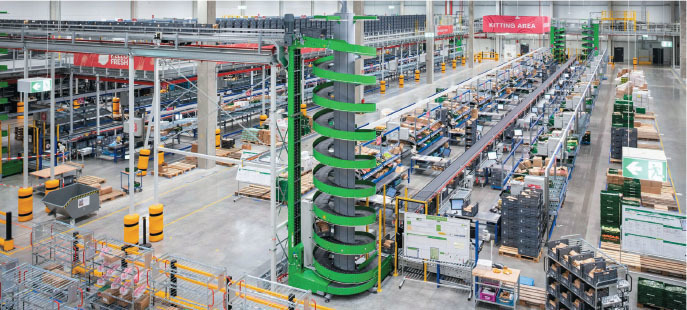
Everyone is focusing on sustainability these days, including the manufacturers of conveyor and sortation systems. Members of MHI’s Conveyor and Sortation Systems (CSS) industry group are making their products—and operations—more sustainable. It’s good for all stakeholders, including their customers and end-users—as well as for the good of the planet overall.
MHI member Hytrol Conveyor Co. Inc. recognizes its responsibility to the environment in several ways, said Boyce Bonham, chief engineer. Hytrol is reducing its carbon footprint by improving the utilization of steel within its manufacturing operation, Bonham said. Moreover, not only is the company recycling all its process scrap, but it’s also reducing the amount of scrap altogether by altering its manufacturing processes. The amount of lumber used in product shipment has also been reduced through the standardization of pallet designs. He said, “This equates to less trees needed and less trees going to waste.”
The company is also mapping its supply chain to make optimal decisions on sources.
“When our supply chain can be closer to the point of utilization, this means lowering the carbon footprint required to get the product to our door,” Bonham said. “Through this effort, some of our components are coming from domestic sources rather than imported. Many of our suppliers are even located in the very region where they manufacture.”
MHI member Phoenix Contact Inc. makes many of the components used by conveyance and sortation systems integrators, and practitioners of the systems are looking to save on consumption of utilities like electricity or compressed air, said Matthew Clark, BDAE, motor systems.
“The first step to any process is to establish a baseline, where they can measure the use of these utilities to optimize processes in these systems,” Clark said. “That’s where we come in not only with pieces and parts to measure and control, but also with software to tie all the processes together, at times working with the integrators on new and existing equipment.”
Phoenix Contact can perform condition-based monitoring, energy monitoring or utility monitoring, or “something as simple” as how many packages go down the line during a certain period of time, he said.
As for its own operations, Phoenix Contact aims to be a net-zero factory globally by 2030, as well as reduce the carbon footprint of its products at all of the different stages—production, transportation and utilization through end of life, said Nathan Owens, director of product marketing—connectivity.
“This year, we have even begun creating ‘product environmental footprint’ documents on some of our high-running products in accordance with DIN EN ISO 14040 and DIN EN ISO 14044,” Owens said. “This translates into transparency and a reduced effort for end-customers who will be seeking increased environmental data to meet their own upstream and manufacturing carbon footprint targets.”
Automating processes can also enhance sustainability. Automation in warehouses is becoming increasingly necessary to offset the higher cost of facilities closer to cities, coupled with ongoing labor shortages, said Taoufik (TK) Haddadi, sales manager at MHI member Ryson International Inc. As part of this, conveyance and sortation systems are becoming more efficient and sustainable.
Mobile touch components and controls enable the systems to be more reliable, greener and more efficient, he said. The systems are also now more vertical, leveraging more air space so warehouses can be in smaller spaces. In addition, the systems are low voltage, using greener, more efficient power, and have a low noise level. No lubrication is needed for the parts because the equipment is low friction.
“Moreover, the units are modular, so customers can retrofit the equipment and leverage it in different locations,” Haddadi said. “That way, they don’t have to buy all new equipment, which saves on costs as well as the environment, as the existing equipment becomes more reusable.”
There is great value to the CSS industry group, the members say.
CSS members meet in person each year during MHI’s trade shows, ProMat and MODEX, and the group also conducts monthly online meetings that include guest speakers to discuss the future of the industry “and where the focus should be,” Haddadi said.
“There’s a lot of added value when members of CSS get together because of the information that’s shared,” he said. “You can get special business development, strategic planning for the future and identify gaps.”
Click here to read the full article.
PHOTO PROVIDED BY RYSON INTERNATIONAL INC.
 MHI Solutions Improving Supply Chain Performance
MHI Solutions Improving Supply Chain Performance